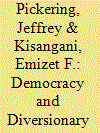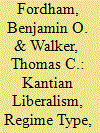|
|
|
Sort Order |
|
|
|
Items / Page
|
|
|
|
|
|
|
| Srl | Item |
| 1 |
ID:
060419


|
|
|
|
|
| Publication |
Mar 2005.
|
| Summary/Abstract |
This article concentrates on two limitations in the literature on diversionary force. First is the common assumption that major powers are the only actors capable of diversion. Second is the narrow conceptualization of regime type prevalent in the literature. Instead of dichotomizing regimes, we distinguish mature democracies and autocracies from consolidating variants of these regimes. We draw hypotheses from the institutional approach and test them with time series cross-section negative binomial first-order autoregressive process estimates of 140 countries from 1950 to 1996. We find that not all democracies and not all autocracies divert. Mature democracies, consolidating autocracies, and transitional polities are the only regime types prone to this type of force. Our results suggest that the diversionary literature would benefit from more discriminating operationalizations of regime type and by looking beyond major powers to the actions of less powerful states.
|
|
|
|
|
|
|
|
|
|
|
|
|
|
|
|
| 2 |
ID:
060429


|
|
|
|
|
| Publication |
Mar 2005.
|
| Summary/Abstract |
In this paper, we evaluate the liberal claim that democratic states devote fewer resources to their militaries. Low military spending is thought to avert conflict spirals and release more resources to fund domestic programs. While prominent in many liberal international relations theories, most notably in Immanuel Kant's, this proposition has received little empirical scrutiny. Using several indicators of military resource allocation and data on a wide range of states since 1816, we find empirical support for the liberal argument, although regime type is not necessarily the strongest influence on military resource allocation.
|
|
|
|
|
|
|
|
|
|
|
|
|
|
|
|
| 3 |
ID:
060427


|
|
|
|
|
| Publication |
Mar 2005.
|
| Summary/Abstract |
This study examines the utility of moving beyond a simple "on-off" dichotomous view of contiguous land borders. For each of the 301 contiguous land borders between states in the international system, measures of ease of interaction, salience, and overall border "vitalness" have been developed using Geographical Information Systems technology. These variables are used to test two major extant lines of thought in international relations literature, as well as our proposed alternative, regarding the expected effect of the "nature" of borders on interstate behavior. We conclude not only that the "nature" of contiguous borders matters but also that the relationship between each of the three border measures and the likelihood of conflict is curvilinear concave-with both high ease of interaction and high salience related to lower levels of conflict, and the middle range of both variables related to higher levels of conflict.
|
|
|
|
|
|
|
|
|
|
|
|
|
|
|
|
| 4 |
ID:
060420


|
|
|
|
|
| Publication |
Mar 2005.
|
| Summary/Abstract |
end of the twentieth century was marked by a sea change in global governance in the realm of intellectual property rights (IPRs). Whereas countries historically retained substantial autonomy with regard to what they defined as intellectual "property" and the rights granted to the owners of intellectual property, the 1990s witnessed the establishment of new global obligations regarding national practices. This paper focuses on the case of software "piracy" to assess the mechanisms by which the new global obligations for the treatment of IPRs are transmitted from the international to the national levels. We first consider a set of national-level factors that many scholars have shown to be important determinants of IPR policy. We then supplement the standard emphasis on domestic factors with an analysis of new transnational factors: countries' multilateral obligations under the World Trade Organization's (WTO) Agreement on Trade-Related Aspects of Intellectual Property Rights (TRIPS) and bilateral pressures from the United States to increase the protection of IPRs. Population-averaged panel data models are used to assess the effects of these national and transnational determinants on levels of software piracy in 80 countries from 1994 to 2002. Our results indicate that membership in the WTO and bilateral pressures from the United States-particularly pressures that offer reciprocal concessions-lead to substantial increases in levels of protection in rich and poor countries. There is, in short, a new international political economy of intellectual property.
|
|
|
|
|
|
|
|
|
|
|
|
|
|
|
|
| 5 |
ID:
060418


|
|
|
|
|
| Publication |
Mar 2005.
|
| Summary/Abstract |
Methodological issues have constituted some of the deepest sources of misunderstanding between International Relations (IR) feminists and IR theorists working in social scientific frameworks. IR theorists have called upon feminists to frame their research questions in terms of testable hypotheses. Feminists have responded that their research questions cannot be answered using social science explanatory frameworks. Deep epistemological divisions about the construction and purpose of knowledge make bridging these methodological divides difficult. These epistemological standards lead feminists to very different methodological perspectives. Asking different questions from those typically asked in IR, many IR feminists have drawn on ethnographic, narrative, cross-cultural, and other methods that are rarely taught to students of IR, to answer them. Drawing on a range of interdisciplinary scholarship on feminist methodologies and some recent IR feminist case studies, this article analyzes and assesses how these methodological orientations are useful for understanding the gendering of international politics, the state and its security-seeking practices and its effects on the lives of women and men
|
|
|
|
|
|
|
|
|
|
|
|
|
|
|
|
| 6 |
ID:
060422


|
|
|
|
|
| Publication |
Mar 2005.
|
| Summary/Abstract |
Recent research suggests a conditional relationship between states' domestic regimes or ideologies and their alliances. I argue that the likelihood that alliances will form along ideological lines increases with the fear among at least two governments of ideology I that they are threatened by transnational rival ideology J. Understanding the power of demonstration effects-that when J advances in one country it gains credibility in others-I-governments will have an incentive to enter an international agreement to oppose J domestically. Such domestic-security agreements will exacerbate the security dilemma, raising fears among J-governments that I-governments are forming a bloc directed at J and J-governments. J-governments will tend to respond by increasing cooperation among themselves, inducing corresponding fears among I-governments; the coalescing I- and J-blocs will tend to spiral into alliances. I- or J-governments wishing to avoid ideologically based alliances may signal an absence of rollback intentions through various means. I demonstrate this process of alliance formation with a lengthy case study of alliance formation in the Holy Roman Empire in the sixteenth century.
|
|
|
|
|
|
|
|
|
|
|
|
|
|
|
|
| 7 |
ID:
060425


|
|
|
|
|
| Publication |
Mar 2005.
|
| Summary/Abstract |
Why would a state encourage illegal immigration over the opposition of its citizens? According to the theories of immigration and citizenship, we should expect exactly the opposite: that states will monitor, control, and restrict illegal immigrants' access to citizenship on behalf of its citizens, as has been the experience of most countries. I use my research on Filipino immigration to Sabah, Malaysia to show how Malaysia utilizes census practices and documentation to incorporate an illegal immigrant population from the Philippines. Illegal immigrants play an electoral role in Sabah because of the loosely institutionalized nature of citizenship, a feature common to many other developing countries. Our examination of Malaysia reveals several elements of illegal immigration and citizenship that are common to migratory flows in other developing countries. I conclude by showing how this case is generalizable and what it tells us about illegal immigrant participation in the international system.
|
|
|
|
|
|
|
|
|
|
|
|
|
|
|
|
|
|
|
|
|